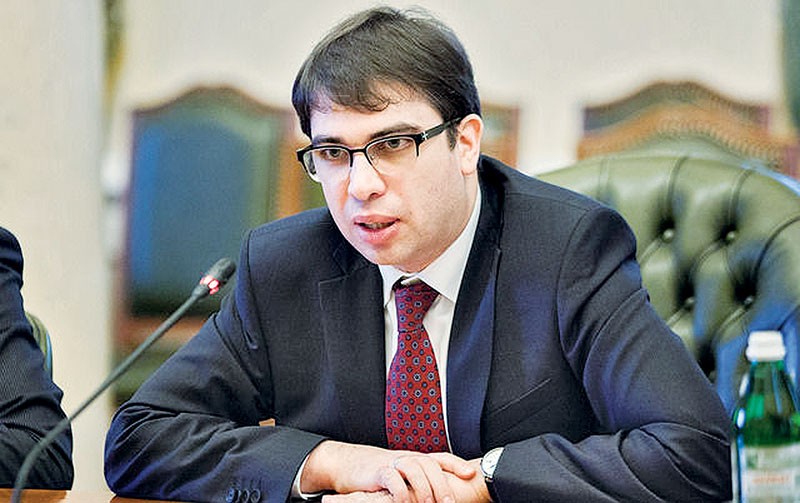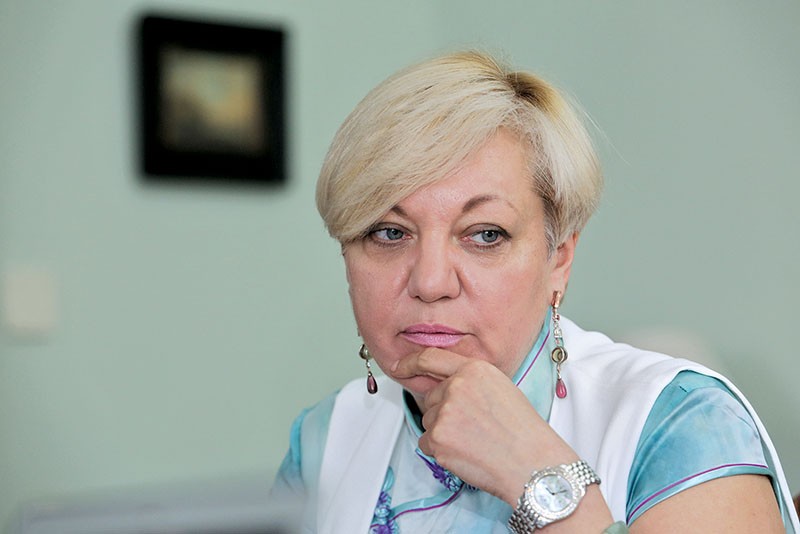Big Four auditor PwC allegedly helped PrivatBank commit a multibillion-dollar embezzlement scheme, officials from the National Bank of Ukraine said last month.
NBU officials pursued a behind-the-scenes campaign to disbar auditor PwC from the country last month after PrivatBank, Ukraine’s largest bank with 20 percent of the sector’s assets, was nationalized in December.
Central bank officials have accused the London-based international auditor of helping to falsify the books of PrivatBank, whose nationalization could cost Ukrainian taxpayers as much as $6 billion.
PwC refused to comment. When asked on Feb. 7 about the issue, National Bank of Ukraine Governor Valeria Gontareva also did not elaborate on claims made by Igor Budnik, the central bank’s head of risk management.
PwC “was trying to lead the user of their reports into confusion,” Budnik said in a Jan. 18 interview with business website Delo, adding that there were significant differences in the actual value of the collateral on PrivatBank’s loan books and PwC’s appraisals in “practically everything that they valuated.”
The government took over PrivatBank, formerly owned by oligarch Igor Kolomoisky, to fill an alleged Hr 146 billion ($5.4 billion) hole in its balance sheets caused by massive insider lending made without adequate collateral.
Budnik and NBU collateral official Tetiana Sirosh called for the Big Four auditor’s Ukraine branch to be closed. “We are waiting for PwC’s office in Ukraine to be closed,” Sirosh said.
As a regulator, the NBU’s power to go after the auditor is limited.The State Property Fund has the legal power under Ukrainian law to cancel an accounting firm’s license.

Igor Budnik, head of risk management for National Bank of Ukraine. (Courtesy)
Phony financials
PwC audited PrivatBank’s finances for years until the bank was nationalized in December.
The only one of the Big Four auditors to have an office in Dnipro, where PrivatBank is based, the firm acted as loan appraiser, auditor and accountant for the bank.
The arrangement violated professional standards and could have led to conflicts of interest, NBU officials said in the Jan. 18 interview with Delo.
Insider lending — which some liken to embezzlement — was rampant in Kolomoisky’s insolvent PrivatBank. After its nationalization, the NBU estimated that 97 percent of the bank’s loan portfolio was comprised of loans to companies linked to Kolomoisky.
Oleksandr Zavadetsky, a former NBU official who reviewed PrivatBank as head of the central bank’s related party loan monitoring division, said that there was “serious disagreement” between the central bank and PwC.
“We discussed the method of their audit that the NBU considered unacceptable,” Zavadetsky said. “Factually, it turned out that their audit differed from what the NBU got from its diagnostic results – identifying the insider loans.”
In one anecdote from the Delo interview, Budnik said that PwC appraised airplanes listed as collateral by PrivatBank. The auditors claimed they went to Boryspil International Airport to verify the collateral, but their report included only a picture of an airplane taken from the internet. In the background, Budnik said, the sign “Antaliya International Airport” was visible.
Sirosh argued that PwC filed their reports in such a way as to shield themselves from any legal liability for the audits.
PrivatBank directors would sign the reports, she said, but PwC appraisers would not. At a cursory glance, the report would appear to be complete, but did not meet the requirements for assigning legal liability to PwC.
“What PwC was producing, in principle should not have been used as an evaluation report,” Budnik said.
Pulling back
The NBU appears to be pulling back from an offensive against the London-based auditor.
In the last week of January, two partners from PwC’s London office flew to Kyiv to quell the anger of NBU officials over the botched audit. The auditor representatives told officials that the firm had launched an internal investigation into the matter.
In the Delo interview, Budnik and Sirosh said that the State Property Fund briefly cancelled PwC’s license on Nov. 22, but reinstated it on Nov. 28.
“They admitted that even a month before cancelling the license PwC gave documents for receiving a new license,” Sirosh said. “So [PwC] already knew then that their license would be cancelled.”
PrivatBank is not PwC’s first imbroglio in Ukraine. In 2014, oligarch Vadim Novinsky got into a conflict with PwC after he hired the auditor to perform due diligence on Bank Forum.
But after buying the bank, Novinsky discovered that it was in much worse condition than he believed, allegedly worth less than the $80 million that Novinsky paid for the financial institution.
The oligarch partly blamed PwC, saying that their audit failed to provide the true value of the bank.
A separate case involving auditor BDO saw the government disbar the Belgian firm’s Ukraine division for “non-compliance with the auditing requirements” and verifying incorrect information about an unnamed client, according to an August NBU press release. BDO however, appealed the decision and was reinstated in September.
“As history has already shown, not only in Ukraine but around the world, the Big Four do not take responsibility for the conclusions they reach,” Rostyslav Kravets, a Kyiv attorney at Kravets and Partners, said.
Kravets said the auditor could be held liable under Ukrainian law for losses sustained due to PrivatBank’s nationalization. The NBU could file a civil lawsuit against the auditor as well, Kravets noted.
While the facts support making such a claim, “I hardly believe that there will be a positive decision here due to a lack of political will in the country,” Kravets added.

National Bank of Ukraine Governor Valeria Gontareva has closed dozens of insolvent banks in a sector dominated by 40 banks. The top three banks are state-owned. Massive fraud and insider lending has cost taxpayers at least $20 billion. (Volodymyr Petrov)
Central bank cites ‘poor audit’ of banks, backs law to improve quality
In a statement on Feb. 9, the National Bank of Ukraine said it “began the systemic solving of problems with the quality of audit services to the banks two years ago simultaneously with the reform of the banking system.
Poor audit of financial statements of banks has not only increased the bankruptcy risks, but also significantly reduced customers’ and potential investors’ confidence in banks.
That is why the clean-up of the banking system was about not only withdrawing insolvent banks from the market, but also about banning the banks from working with audit companies that provide positive conclusions of failed banks.
To this end, the National Bank has in 2015 made the necessary changes in their regulations governing external audit of banks.”
Additionally, the central bank said that “the problem of poor quality of audit services refers not only to the banking sector.
Therefore, in order to provide a comprehensive resolution to improving the quality of audit services and the reform of the sector as a whole,” NBU experts joined others in government to support legislation that “improves the system of audit regulation in line with international standards.”
The government approved the new measures on Jan. 25 and now the proposed law awaits action in parliament.
